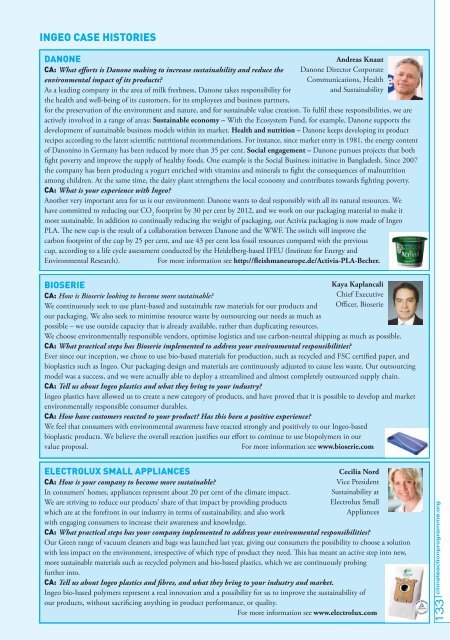Climate Action 2011-2012
Create successful ePaper yourself
Turn your PDF publications into a flip-book with our unique Google optimized e-Paper software.
iNgeo CASe hiStorieS<br />
DANoNe<br />
CA: What efforts is Danone making to increase sustainability and reduce the<br />
environmental impact of its products?<br />
As a leading company in the area of milk freshness, Danone takes responsibility for<br />
the health and well-being of its customers, for its employees and business partners,<br />
Andreas Knaut<br />
Danone Director Corporate<br />
Communications, Health<br />
and Sustainability<br />
for the preservation of the environment and nature, and for sustainable value creation. To fulfil these responsibilities, we are<br />
actively involved in a range of areas: Sustainable economy – With the Ecosystem Fund, for example, Danone supports the<br />
development of sustainable business models within its market. Health and nutrition – Danone keeps developing its product<br />
recipes according to the latest scientific nutritional recommendations. For instance, since market entry in 1981, the energy content<br />
of Danonino in Germany has been reduced by more than 35 per cent. Social engagement – Danone pursues projects that both<br />
fight poverty and improve the supply of healthy foods. One example is the Social Business initiative in Bangladesh. Since 2007<br />
the company has been producing a yogurt enriched with vitamins and minerals to fight the consequences of malnutrition<br />
among children. At the same time, the dairy plant strengthens the local economy and contributes towards fighting poverty.<br />
CA: What is your experience with Ingeo?<br />
Another very important area for us is our environment: Danone wants to deal responsibly with all its natural resources. We<br />
have committed to reducing our CO 2<br />
footprint by 30 per cent by <strong>2012</strong>, and we work on our packaging material to make it<br />
more sustainable. In addition to continually reducing the weight of packaging, our Activia packaging is now made of Ingeo<br />
PLA. The new cup is the result of a collaboration between Danone and the WWF. The switch will improve the<br />
carbon footprint of the cup by 25 per cent, and use 43 per cent less fossil resources compared with the previous<br />
cup, according to a life cycle assessment conducted by the Heidelberg-based IFEU (Institute for Energy and<br />
Environmental Research). For more information see http://fleishmaneurope.de/Activia-PLA-Becher.<br />
BioSerie<br />
CA: How is Bioserie looking to become more sustainable?<br />
We continuously seek to use plant-based and sustainable raw materials for our products and<br />
our packaging. We also seek to minimise resource waste by outsourcing our needs as much as<br />
possible – we use outside capacity that is already available, rather than duplicating resources.<br />
Kaya Kaplancali<br />
Chief Executive<br />
Officer, Bioserie<br />
We choose environmentally responsible vendors, optimise logistics and use carbon-neutral shipping as much as possible.<br />
CA: What practical steps has Bioserie implemented to address your environmental responsibilities?<br />
Ever since our inception, we chose to use bio-based materials for production, such as recycled and FSC certified paper, and<br />
bioplastics such as Ingeo. Our packaging design and materials are continuously adjusted to cause less waste. Our outsourcing<br />
model was a success, and we were actually able to deploy a streamlined and almost completely outsourced supply chain.<br />
CA: Tell us about Ingeo plastics and what they bring to your industry?<br />
Ingeo plastics have allowed us to create a new category of products, and have proved that it is possible to develop and market<br />
environmentally responsible consumer durables.<br />
CA: How have customers reacted to your product? Has this been a positive experience?<br />
We feel that consumers with environmental awareness have reacted strongly and positively to our Ingeo-based<br />
bioplastic products. We believe the overall reaction justifies our effort to continue to use biopolymers in our<br />
value proposal.<br />
For more information see www.bioserie.com<br />
eLeCtroLux SmALL AppLiANCeS<br />
Cecilia Nord<br />
CA: How is your company to become more sustainable?<br />
Vice President<br />
In consumers’ homes, appliances represent about 20 per cent of the climate impact.<br />
Sustainability at<br />
We are striving to reduce our products’ share of that impact by providing products<br />
Electrolux Small<br />
which are at the forefront in our industry in terms of sustainability, and also work<br />
Appliances<br />
with engaging consumers to increase their awareness and knowledge.<br />
CA: What practical steps has your company implemented to address your environmental responsibilities?<br />
Our Green range of vacuum cleaners and bags was launched last year, giving our consumers the possibility to choose a solution<br />
with less impact on the environment, irrespective of which type of product they need. This has meant an active step into new,<br />
more sustainable materials such as recycled polymers and bio-based plastics, which we are continuously probing<br />
further into.<br />
CA: Tell us about Ingeo plastics and fibres, and what they bring to your industry and market.<br />
Ingeo bio-based polymers represent a real innovation and a possibility for us to improve the sustainability of<br />
our products, without sacrificing anything in product performance, or quality.<br />
For more information see www.electrolux.com<br />
133 climateactionprogramme.org












